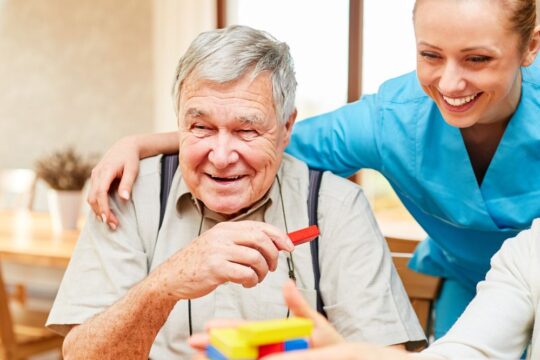
What is Caregiver Burnout?
What to do About Caregiver Burnout
What is caregiver burnout?
Burnout is a state of being physically, emotionally, and mentally tired from caring for another person. When caregivers are stressed, they may feel tired, anxious, or sad. A caregiver with burnout is overworked and exhausted physically, emotionally, and mentally from taking care of a loved one. As a result, they may feel alone, without support, or not valued.
Often, they have not had the time to take care of themselves well, and they may be sad. They may lose interest in taking care of themselves and the person in their charge. Almost all caregivers get tired of their jobs at some point. If it does happen and nothing is done about it, the caregiver will lose the ability to give good care. Because of this, caregiver burnout can be bad for both the person getting care and the person giving care.
What are the signs and symptoms of caregiver burnout?
There are signs that show up before burnout happens. If you know what to look for, you can better handle the problem of burnout and seek help before it’s too late. Some of the most common signs and symptoms of caregiver burnout are excessive worry, isolation, frequent bad mood, fatigue, inability to handle problems, lack of interest, and a loss of personal care.
When caregiver burnout happens, it shows up physically and emotionally. Overextending yourself caring for another person can show up as body pain, headaches, changes in appetite, insomnia, and a weakened immune system. As burnout worsens and depression and anxiety worsen, caregivers may try to ease the symptoms by drinking or taking drugs, especially stimulants.
What causes caregiver burnout?
Caregivers are often so busy taking care of others that they do not pay enough attention to their own mental, physical, and spiritual health. As a result, a caregiver’s body, mind, and emotions are often put under a lot of stress, making them feel tired, hopeless, and eventually burnt out. Additionally, other problems can come about that lead to burnout.
Many people do not know what to do when they have to take care of someone. People may find it hard to separate their role as a caregiver from their role as a spouse, partner, parent, child, friend, or in another close relationship. This can lead to unrealistic expectations as many caregivers think that what they do will make the patient healthier and happier. This may not be possible for people with diseases that get worse over time, like Parkinson’s or Alzheimer’s.
Furthermore, caregivers often get frustrated because they do not have enough money, resources, or skills to plan, manage, and organize the care of their loved ones in the best way possible. In addition, some caregivers put too much on themselves because they think caring for someone is their only job. Finally, a caregiver’s desire to be perfect can often keep them from doing what they must do.
What factors cause caregiver burnout?
Often the biggest factor that causes caregiver burnout is the feeling of being pulled in too many directions at once. Many caregivers have children, a spouse, work, household, and financial responsibilities. These things do not go away when they take on the care of an elderly parent. Instead, they are stacked on top until the to-do list begins to topple and crashes down.
The caregiver may reach a point of fight or flight. While they want to take care of everything they were doing before they became a caregiver and take care of their parent, it’s often too much. At first, they may start full steam ahead but find quickly that they cannot handle the load or the accompanying stress. Then they find ways to take flight to cope.
Add in the pressure to keep everything clean, sterilized, and safe for their parent, and the whole system becomes overwhelming. The overwhelming feeling leads to high-stress levels and bottoms out at burnout. Soon they have nothing left to give and no care to do so either.
Even though caregivers may feel like they are alone, they often do not get much time to themselves. Most people have a real need for alone time, and the stress of not getting enough alone time can feel confusing to someone who also feels alone. However, caregivers can have both feelings simultaneously, which adds to their stress.
Sometimes the responsibility and feeling of being alone can be too much for caregivers, and they feel worn out. Some people feel guilty when they have these kinds of feelings as if they are a sign of not being loyal. A caregiver may also feel guilty if they do not make their loved one as comfortable as they could, even if there is nothing else they can do. Even though it’s normal to feel frustrated, most people still feel guilty.
These are just a few things that can cause stress for caregivers. Many people may think their stress levels are too high and they are not handling things as well as they should. You are under a lot of pressure, which makes you feel stressed. Especially if you have been a caregiver for a long time or if you have a lot of responsibilities as a caregiver, it’s important to find a way to release your stress.
What are two things that caregiver burnout may lead to?
The two main aspects that burnout can lead to are a loss of self and depression.
Caregivers may feel like they have no control or do not know enough or have the right skills to do the job. They can also feel like a caged animal with no freedom to breathe or have their own life. Coupled with feelings of not being able to do everything, they will feel like a failure leading to depression.
As the loss of self and depression sink in, they will lead to a spiral of symptoms such as withdrawal, loss of hope, ignoring others’ needs, health problems for themselves, lowered self-esteem, and isolation. Often the caregiver needs someone to take care of them sometimes, but they may not be able to communicate this need to siblings, children, or a spouse as they do not want to become a burden.
How can I prevent caregiver burnout?
Prevent caregiver burnout by knowing your limits and taking a look at your life. First, recognize and accept that you might get tired of being a caregiver. Next, talk about how you feel about someone you trust, like a friend, coworker, or neighbor.
Next, make doable goals and accept that you might need help, and ask others to help you with some things. If your loved one has a disease that worsens over time, like Parkinson’s or Alzheimer’s, be realistic about what you can and cannot do for them. Additionally, give yourself some time, even if it’s just an hour or two.
In addition, you should talk to an expert, like a therapist, social worker, or clergy member. Look for support groups or workshops for caregivers that can help you learn how to deal with stress. Lastly, stay healthy by eating right, working out, and getting enough rest.
Where can I turn for help for caregiver burnout?
If you are already stressed out and depressed, you should see a doctor. Stress and depression are both disorders that can be treated. If you want to help stop burnout, you might want to look into home health services, respite care, adult day care, nursing homes, private care aides, or caregiver support services. Find local help for your state and see what options are available. Again, see a support group as they can help you with the emotional side of caregiving which is often the hardest part.
Additionally, you may have people closer to home who can help. May you have a sibling who can help, or your spouse could give you some time off too. Consider other family members such as cousins, aunts, uncles, etc. Even a friend may be willing to help out; a friend of the person you are caring for and not just one of your friends could be an option.
You are not the only caregiver who is feeling burned out. It might be time to find a different way to meet your loved one’s needs or a solution that will last longer. Call Stellar Care today if you or a loved one thinks it is time to find a new home that can help with daily needs. We can help you to find the right solution for your parents to take care of them and allow you the option to take care of yourself too.
Related Articles
Understand the symptoms and risk factors of ADHD and dementia. Explore the differences, and common misconceptions.
Do people with diabetes have a higher risk of dementia due to factors like insulin resistance, blood vessel damage, and inflammation?
Understand the symptoms and risk factors of ADHD and dementia. Explore the differences, and common misconceptions.
Confused about hospice or hospital care? Learn the essential differences and choose the best option for your needs.
Our Services
Memory Care
Club Stellar
Dining
Activities

A Memory Care Community
4518 54th Street • San Diego, CA 92115
Phone: (619) 287-2920
LICENSE #374603625
Copyright © Stellar Care | Website Development by blue media marketing, Inc.




